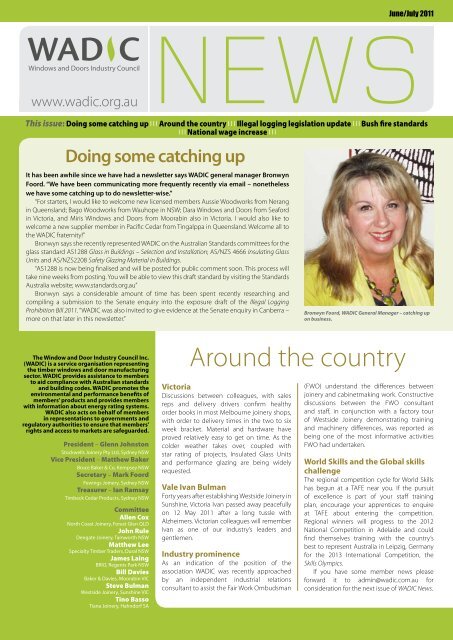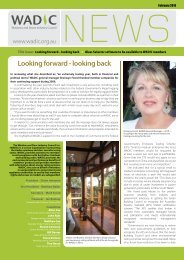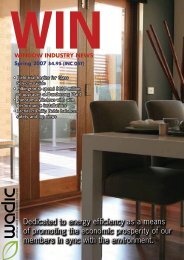WADIC Newsletter (June 2011).pdf
WADIC Newsletter (June 2011).pdf
WADIC Newsletter (June 2011).pdf
You also want an ePaper? Increase the reach of your titles
YUMPU automatically turns print PDFs into web optimized ePapers that Google loves.
<strong>June</strong>/July <strong>2011</strong><br />
Windows and Doors Industry Council<br />
www.wadic.org.au<br />
NEWS<br />
This issue: Doing some catching up l l l Around the country l l l Illegal logging legislation update l l l Bush fire standards<br />
l l l National wage increase l l l<br />
Doing some catching up<br />
It has been awhile since we have had a newsletter says <strong>WADIC</strong> general manager Bronwyn<br />
Foord. “We have been communicating more frequently recently via email – nonetheless<br />
we have some catching up to do newsletter-wise.”<br />
“For starters, I would like to welcome new licensed members Aussie Woodworks from Nerang<br />
in Queensland; Bago Woodworks from Wauhope in NSW; Dara Windows and Doors from Seaford<br />
in Victoria, and Miris Windows and Doors from Moorabin also in Victoria. I would also like to<br />
welcome a new supplier member in Pacific Cedar from Tingalppa in Queensland. Welcome all to<br />
the <strong>WADIC</strong> fraternity!”<br />
Bronwyn says she recently represented <strong>WADIC</strong> on the Australian Standards committees for the<br />
glass standard AS1288 Glass in Buildings – Selection and Installation; AS/NZS 4666 Insulating Glass<br />
Units and AS/NZS2208 Safety Glazing Material in Buildings.<br />
“AS1288 is now being finalised and will be posted for public comment soon. This process will<br />
take nine weeks from posting. You will be able to view this draft standard by visiting the Standards<br />
Australia website; www.standards.org.au”<br />
Bronwyn says a considerable amount of time has been spent recently researching and<br />
compiling a submission to the Senate enquiry into the exposure draft of the Illegal Logging<br />
Prohibition Bill <strong>2011</strong>. “<strong>WADIC</strong> was also invited to give evidence at the Senate enquiry in Canberra –<br />
more on that later in this newsletter.”<br />
Bronwyn Foord, <strong>WADIC</strong> General Manager – catching up<br />
on business.<br />
The Window and Door Industry Council Inc.<br />
(<strong>WADIC</strong>) is a service organisation representing<br />
the timber windows and door manufacturing<br />
sector. <strong>WADIC</strong> provides assistance to members<br />
to aid compliance with Australian standards<br />
and building codes. <strong>WADIC</strong> promotes the<br />
environmental and performance benefits of<br />
members’ products and provides members<br />
with information about energy rating systems.<br />
<strong>WADIC</strong> also acts on behalf of members<br />
in representations to governments and<br />
regulatory authorities to ensure that members’<br />
rights and access to markets are safeguarded.<br />
President – Glenn Johnston<br />
Stockwells Joinery Pty Ltd, Sydney NSW<br />
Vice President – Matthew Baker<br />
Bruce Baker & Co, Kempsey NSW<br />
Secretary – Mark Foord<br />
Fewings Joinery, Sydney NSW<br />
Treasurer – Ian Ramsay<br />
Timbeck Cedar Products, Sydney NSW<br />
Committee<br />
Allen Cox<br />
North Coast Joinery, Forest Glen QLD<br />
John Rule<br />
Dengate Joinery, Tamworth NSW<br />
Matthew Lee<br />
Specialty Timber Traders, Dural NSW<br />
James Laing<br />
BRIO, Regents Park NSW<br />
Bill Davies<br />
Baker & Davies, Moorabin VIC<br />
Steve Bulman<br />
Westside Joinery, Sunshine VIC<br />
Tino Basso<br />
Tiana Joinery, Hahndorf SA<br />
Around the country<br />
Victoria<br />
Discussions between colleagues, with sales<br />
reps and delivery drivers confirm healthy<br />
order books in most Melbourne joinery shops,<br />
with order to delivery times in the two to six<br />
week bracket. Material and hardware have<br />
proved relatively easy to get on time. As the<br />
colder weather takes over, coupled with<br />
star rating of projects, Insulated Glass Units<br />
and performance glazing are being widely<br />
requested.<br />
Vale Ivan Bulman<br />
Forty years after establishing Westside Joinery in<br />
Sunshine, Victoria Ivan passed away peacefully<br />
on 12 May <strong>2011</strong> after a long tussle with<br />
Alzheimers. Victorian colleagues will remember<br />
Ivan as one of our industry’s leaders and<br />
gentlemen.<br />
Industry prominence<br />
As an indication of the position of the<br />
association <strong>WADIC</strong> was recently approached<br />
by an independent industrial relations<br />
consultant to assist the Fair Work Ombudsman<br />
(FWO) understand the differences between<br />
joinery and cabinetmaking work. Constructive<br />
discussions between the FWO consultant<br />
and staff, in conjunction with a factory tour<br />
of Westside Joinery demonstrating training<br />
and machinery differences, was reported as<br />
being one of the most informative activities<br />
FWO had undertaken.<br />
World Skills and the Global skills<br />
challenge<br />
The regional competition cycle for World Skills<br />
has begun at a TAFE near you. If the pursuit<br />
of excellence is part of your staff training<br />
plan, encourage your apprentices to enquire<br />
at TAFE about entering the competition.<br />
Regional winners will progress to the 2012<br />
National Competition in Adelaide and could<br />
find themselves training with the country’s<br />
best to represent Australia in Leipzig, Germany<br />
for the 2013 International Competition, the<br />
Skills Olympics.<br />
If you have some member news please<br />
forward it to admin@wadic.com.au for<br />
consideration for the next issue of <strong>WADIC</strong> News.
Illegal logging legislation update<br />
<strong>WADIC</strong> was invited to give evidence to the<br />
Rural Affairs and Transport Senate Committee<br />
hearing on the Illegal Logging Prohibition Bill<br />
<strong>2011</strong> held at Parliament House on 16 May.<br />
“<strong>WADIC</strong> was one of only eleven asked to<br />
give evidence at five days notice!” says general<br />
manager Bronwyn Foord.<br />
Others that gave evidence were the<br />
Australian Timber Importers Federation,<br />
Australian Forestry Standard, Australian Forest<br />
Products Association, Papua New Guinea<br />
Forest Industries Association, Australian<br />
Network of Environmental Defender’s Offices<br />
and Humane Society, Greenpeace Australia<br />
Pacific, Australian Forest Growers, New Zealand<br />
High Commission and the Department of<br />
Agriculture, Fisheries and Forestry.<br />
“A number of witnesses were interrogated<br />
exhaustively. Our submission was in the main<br />
treated in a much more consultative and<br />
sympathetic manner. Both Senator Colbeck<br />
(Liberal, Tasmania) and Senator O’Brien<br />
(Labor, Tasmania) made it clear that they did<br />
not want small to medium businesses to be<br />
unduly encumbered by layers of bureaucratic<br />
requirements and expense,” says Mrs Foord.<br />
Bronwyn says the main recommendations<br />
of <strong>WADIC</strong>’s evidence were.<br />
1. Least possible legislation compliance costs.<br />
2. That all imported products containing wood<br />
be regulated to ensure fair competition,<br />
regulatory effectiveness and fair treatment<br />
under the proposed legislation.<br />
3. That the Bill be amended to include<br />
governance and accountability mechanisms<br />
for appointed timber industry certifiers.<br />
Bush fire standards<br />
Bush fire standards – not up to the manufacturer to make<br />
assumptions or decisions about standards, get clear<br />
directions as to what precisely is required from the client.<br />
Some <strong>WADIC</strong> members are continuing to<br />
experience problems with interpreting new<br />
bush fire standards. The Wood Solutions Booklet<br />
04 Building with timber in bushfire-prone areas<br />
that has recently been reviewed is still the best<br />
resource for interpreting the standard (www.<br />
woodsolutions.com.au). However, it is wise to<br />
purchase the standard (AS 3959-2009) itself<br />
rather than rely on the booklet alone.<br />
<strong>WADIC</strong> general manager Bronwyn Foord<br />
says the third amendment of the standard is<br />
close to completion. “I will notify members<br />
when it is to be posted for public comment.”<br />
Bronwyn added it was important to note<br />
that different state governments and local<br />
bush fire brigades have the ability to upgrade<br />
the requirements should they elect to do so.<br />
“Confusing us all even further – you should<br />
be extremely careful when ascertaining what<br />
standard your products are required to comply<br />
with – whether it is the old standard (AS 3959<br />
– 1999) or the new standard (AS 3959 – 2009).<br />
Some projects yet to be completed will be<br />
compliant with the old standard.”<br />
“When you are required to give a certification<br />
it needs to be limited to exactly the standard<br />
requested and nothing more. Be careful with<br />
the paper work and spell out the required<br />
manufacturing standard. Do however point out<br />
that a new standard does exist,” she says.<br />
Bronwyn also pointed out that the current<br />
standard Bushfire Attack Level (BAL) should<br />
not be considered the same as the old level<br />
numbering system as they vary. “Be certain<br />
to certify the manufactured products under<br />
the code you have manufactured to and no<br />
other. It is not up to the manufacturer to make<br />
assumptions or decisions as to what standard<br />
to adopt. It is up to the client/specifier/builder/<br />
architect to give clear directions as to what<br />
precisely is required, not only for this standard<br />
but any standard.”<br />
The current AS 3959-2009 04 (Building with<br />
timber in bushfire-prone areas) makes reference<br />
to Fire retardant (FR) treated timbers up to BAL<br />
29. Following a number of enquiries received<br />
<strong>WADIC</strong> has investigated this issue. “Our current<br />
understanding following discussions with a<br />
representative of the NSW Rural Fire Service and<br />
the Melbourne equivalent found; “they do not<br />
accept that a fire retardant changes or replaces the<br />
prescribed timber for BAL levels,” says Mrs Foord.<br />
“Further investigations were made with<br />
others and although there have been reported<br />
claims of a retardant that can achieve BAL 29<br />
for Western red cedar there does not presently<br />
appear to be one readily available in Australia<br />
that has passed such a test.”<br />
National wage increase<br />
(by Brian Beecroft, CEO, Timber Trade Industrial Association)<br />
On the 3 <strong>June</strong> <strong>2011</strong> Fair Work Australia handed down its second wage decision which will take effect on<br />
the first full pay period on or after 1 July <strong>2011</strong>. Whilst some media have reported the new wage increase<br />
as being $19.40, members are advised that the increase is, in fact, 3.4% of the modern award rate.<br />
The reported increase of $19.40 is for the national minimum wage mainly used for those workers<br />
who are not covered by an award or agreement. The following is an extract from the actual decision:<br />
“[334] The economy is performing reasonably well, labour productivity is growing, the profit share<br />
remains at historically high levels and underlying inflation is well within the RBA’s medium-term target<br />
band. Employment is growing, unemployment is reducing and labour force participation remains high.<br />
In the circumstances a significant increase is appropriate which will improve the real value of award<br />
wages and assist the living standards of the low paid. For the reasons discussed in Chapter 8 we have<br />
adopted a uniform percentage increase. The increase in modern award minimum wages we have<br />
decided on is 3.4 per cent. Weekly wages will be rounded to the nearest 10 cents.<br />
[335] The national minimum wage for award/agreement free employees is currently set at the minimum<br />
wage for the C14 classification, the lowest wage level in the Manufacturing Award. No cogent basis was<br />
advanced for disturbing that relationship. The national minimum wage will be $589.30 per week or $15.51<br />
per hour. The hourly rate has been calculated on the basis of a 38 hour week for a full-time employee, as<br />
required by s.62 of the Fair Work Act. This constitutes an increase of $19.40 per week or 51 cents per hour.”<br />
Remember the wage increase is fully absorbable into over award payments and is effective from the<br />
first pay period on or after 1 July <strong>2011</strong>. Members will be sent new wage summary sheets in due course.<br />
Windows and Doors Industry Council<br />
Contact Us<br />
Bronwyn Foord General Manager<br />
609 Gardeners Rd Mascot NSW 2020<br />
Telephone (02) 9700 8798<br />
Fax (02) 9700 8807<br />
Email (General Enquiries)<br />
info@wadic.com.au<br />
Email (Member & other contact)<br />
admin@wadic.com.au<br />
<strong>Newsletter</strong> Editor<br />
John Halkett<br />
For editorial enquiries contact:<br />
phone 02 9356 3826<br />
email halkettj@netaus.net.au<br />
<strong>Newsletter</strong> Design<br />
Emigraph Creative<br />
Printed on 100% recycled paper




